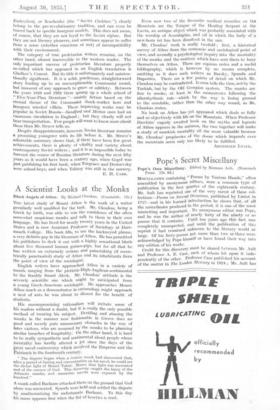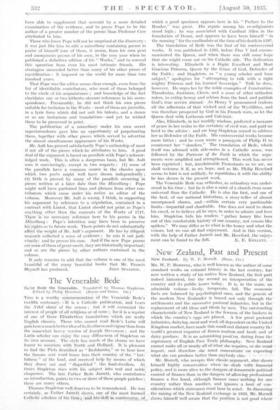Pope's Secret Miscellany
Pope's Own Miscellany. Edited by Norman Ault. (Nonesuch Press. 22s. 6d.) MISCELLANIES containing " Poems by Various Hands," often assembled by anonymous editors, were a common type of publication in the first quarter of the eighteenth century. Mr. Ault has reprinted one of the very rarest of these col- lections—Poems on Several Occasions, published by Lintot in 1717—and in his learned introduction he shows that, of all the miscellanies produced in the period, it is one of the most interesting and important.. Its anonymous editor , was Pope, and ytheaerspuabgolica this n f of t was completely thin and he was the author of nearly forty of the ninety or so a oc poems, that it contains. Until completely unsuspected, d reprint it had remained unknown to the literary world at large. Of his forty poems not more than two or three were acknowledged 'by Pope himself or have found their way into any edition of his works. Credit for this discovery must be shared between Mr. Ault and Professor A. E. Case, each of whom hit upon it inde- pendently of the other. Professor Case published his account of the matter in The London Mercury in 1924 ; Mr. Ault has been able to supplement that account by ,a more detailed examination of the evidence, and to prove Pope to be the author of a greater number of the poems-than Professor Case attributed to him.
Those who know Pope will not be surprised at the discovery. : it was just like him to edit a miscellany containing, poems in praise of himself (one of them, it seems, from his own pen) and anonymous poems of his own, in the very year when he published a definitive edition of his "Works," and to conceal this operation from even his most intimate friends. His stratagem succeeded better than many of his other pieces of mystification : it imposed on the world for more than two hundred years.
That Pope was the editor seems clear enough, even from the list of identifiable contributors, who• most of them belonged to.the circle of his acquaintance ; and knowledge of the fact elucidates one or two hitherto obscure references in his eorre- spOndence. : Presumably, he did not think his own pieces suitable for inclusion in the Werks7—most of them are juvenilia, in a lyric form which did not suit his talents, and a dozen or so are imitations and translations—and yet he wished them to be preserved in print.
The publication of a • miscellany under his own secret superintendence gave him an opportunity of perpetuating them, together with other pieces which served to advertise the almost simultaneous appearance of, his Works.
Mr. Ault has proved satisfactorily Pope's authorship of most if not all of the pieces which he attributes to him. A good deal of the argument is based on parallels with Pope's acknow- ledged work. This is often a. dangerous basis, but Mr. Ault uses it convincingly, except in two respects : (1) some of the parallels have a common source in the classics upon which, two poets might , well have drawn independently ; (2) little is proved by many of the parallels occurring in pieces written at a later date than the Miscellany : Pope Might well have purloined lines and phrases from other, con- tributors which came under his notice as editor of the volume. Moreover Mr. Ault is wrong, I think, in supporting his argument by reference to a stipulation, contained in a contract with Lintot, that Lintot should not print as Pope's anything other than the .contents of the Works of 1717. There is no necessitry reference here to his poems in the ilit'seellany : Pope's intention may have been to preserve his 'rights as to future work. These points do not substantially affect the weight of Mr. Ault's argument. He has by diligent research collected a mass of evidence ; lie sets it out judi- ciously; and he proves his case. And if the new Pope poems are pone of them of great merit, they are historically important; and so are the pieces by other authors contained in the volii me.
t most
_only remains to add that the volume is one of the mos beautiful of the many beautiful books that Mr. Francis



































 Previous page
Previous page